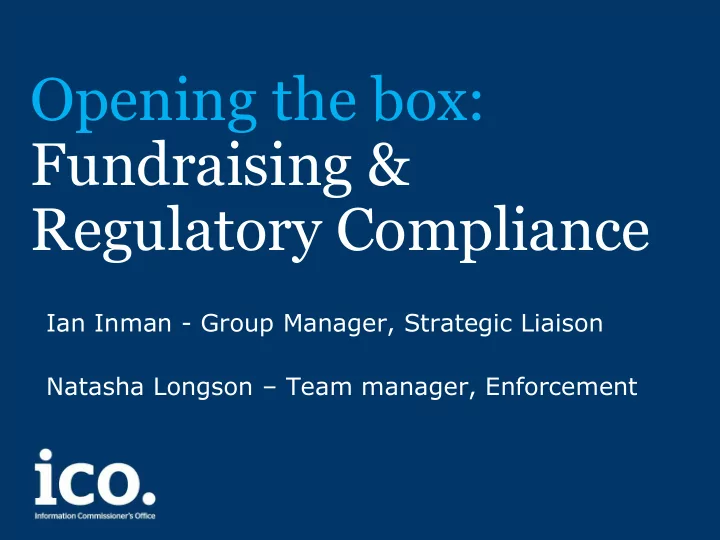

Opening the box: Fundraising & Regulatory Compliance Ian Inman - Group Manager, Strategic Liaison Natasha Longson – Team manager, Enforcement
What are we covering? Key legal concepts • Re-use of publicly available data • Wealth Screening • Data matching/Teleappending •
Key legal concepts Principle 1 DPA: Personal data must be processed fairly and lawfully and on the basis of a schedule 2 and (where necessary) schedule 3 condition. Fairness – 2 parts Transparency – Telling individuals who you are and what • you are doing with their personal data. Fairness – Not processing personal data in ways individuals • would not reasonably expect.
Key legal concepts Principle 1 DPA: Personal data must be processed fairly and lawfully and on the basis of a schedule 2 and (where necessary) schedule 3 condition . Only two relevant to the activities we are looking at today: Consent • Legitimate interests •
Key legal concepts Section 27(5) ‘Except as provided by this part, the subject information provisions shall have effect notwithstanding any enactment or rule of law prohibiting or restricting the disclosure, or authorising the withholding, of information.’ In simple terms – unless you can satisfy an exemption from within the Data Protection Act 1998, the duty to provide fair processing information to individuals will apply!
Re-use of publicly available data Publicly available covers a range of data: Electoral roll • Public registers (Companies • House) Press reports • Social media • Key point: It is not fair game! Remember s.27(5) – You must still provide fair processing information unless an exemption applies!
Wealth Screening
Wealth Screening What is it? Wealth Screening covers a variety of activities: Database segmentation by post code • Detailed research and data collation on • job, income, area of residence, family jobs etc. Aimed at determining likely level of donation or likelihood of legacy donation.
Wealth Screening Data Protection Implications It involves the processing of individuals’ personal data – sometimes • including data that they have not provided to you. It is privacy intrusive – Some acts are less intrusive than others • You will need a schedule condition – If relying on legitimate • interests, remember to consider the prejudice to the rights and freedoms of the individual, particularly their privacy rights! Fairness – Individuals would not reasonably expect this activity to • take place. You must inform them clearly, prominently and in a way they will understand what this involves in terms of the use of their data.
Data matching/teleappending
Data matching/teleappending What is it? Data matching/teleappending covers activities such as: Obtaining telephone numbers or email • addresses, or Obtaining up to date address details • where it becomes apparent an individual has moved.
Data Matching/ Tele-appending Data Protection Implications This will typically involve processing personal data an individual • never provided to you. Fairness – Remember reasonable expectations! Would an individual • reasonably expect you to call them on a number they never gave you? Accuracy – You do not need to do this to comply with your accuracy • obligations under the DPA.
Summary Remember s.27(5) – You must provide fair processing information • unless you have an exemption from the duty to do so. (Regardless of where you obtained the data from) Fairness – Tell people, clearly and prominently what you are doing • with their data. Think! Would individuals reasonably expect you to do what you are doing? If not, the more important it is that you tell them and that you do so clearly, prominently and in a way they can understand. Legitimate basis – are you relying on consent or legitimate • interests? Consent must meet all the requirements set out in the law. It is not sufficient to simply have a legitimate interest, you must balance this against the prejudice to the rights and freedoms of individuals.
Keep in touch Subscribe to our e-newsletter at www.ico.org.uk or find us on… /iconews @iconews
Recommend
More recommend